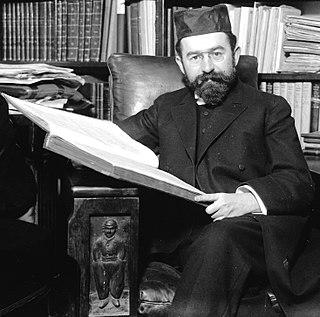A Quote by Reinhold Niebuhr
Reason is not the sole basis of moral virtue in man. His social impulses are more deeply rooted than his rational life.
Related Quotes
But if they are well-founded and just, they can be no less than the high requirements of heaven, addressed by the voice of God to the reason and understanding of man, concerning things deeply affecting his relations to his sovereign, and essential to the formation of his character and of course to his destiny, both for this life and for the life.
Who stands firm? Only the one for whom the final standard is not his reason, his principles, his conscience, his freedom, his virtue, but who is ready to sacrifice all these, when in faith and sole allegiance to God he is called to obedient and responsible action: the responsible person, whose life will be nothing but an answer to God's question and call.
Still, even the most admirable of atheists is nothing more than a moral parasite, living his life based on borrowed ethics. This is why, when pressed, the atheist will often attempt to hide his lack of conviction in his own beliefs behind some poorly formulated utilitarianism, or argue that he acts out of altruistic self-interest. But this is only post-facto rationalization, not reason or rational behavior.
Man is a rational animal—so at least I have been told. … Aristotle, so far as I know, was the first man to proclaim explicitly that man is a rational animal. His reason for this view was … that some people can do sums. … It is in virtue of the intellect that man is a rational animal. The intellect is shown in various ways, but most emphatically by mastery of arithmetic. The Greek system of numerals was very bad, so that the multiplication table was quite difficult, and complicated calculations could only be made by very clever people.
To live his life in his own way, to call his house his castle, to enjoy the fruits of his own labour, to educate his children as his conscience directs, to save for their prosperity after his death -- these are wishes deeply ingrained in civilised man. Their realization is almost as necessary to our virtues as to our happiness. From their total frustration disastrous results both moral and psychological might follow.
You see, gentlemen, reason is an excellent thing, there’s no disputing that, but reason is nothing but reason and satisfies only the rational side of man’s nature, while will is a manifestation of the whole life, that is, of the whole human life including reason and all the impulses. And although our life, in this manifestation of it, is often worthless, yet it is life and not simply extracting square roots.
Michael [Jackson] reconstructed his face and deconstructed the African features into a spooky European geography of fleshly possibilities, and yet what we couldn't deny, that even as his face got whiter and whiter his music got Blacker and Blacker. His soul got more deeply rooted in the existential agony and the profound social grief that Black people are heir to.
Man—every man—is an end in himself, not a means to the ends of others; he must live for his own sake, neither sacrificing himself to others nor sacrificing others to himself; he must work for his rational self-interest, with the achievement of his own happiness as the highest moral purpose of his life.
I have repeatedly stressed that the selfish impulses of man constitute a much less historic danger than his integrative tendencies. To put it in the simplest way: the individual who indulges in an excess of aggressive self-assertiveness incurs the penalties of society-he outlaws himself, he contracts out of the hierarchy. The true believer, on the other hand, becomes more closely knit into it; he enters the womb of his church, or party, or whatever the social holon to which he surrenders his identity.




































